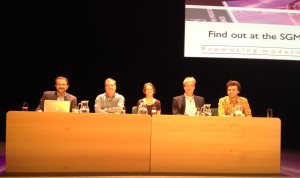Hosts: Vincent Racaniello, Connor Bamford, Wendy Barclay, Richard Elliott, and Ron Fouchier
A discussion of avian influenza H5N1 transmission experiments in ferrets and novel bunyaviruses at the 2012 Spring Conference of the Society for General Microbiology in Dublin, Ireland.
Click the arrow above to play, or right-click to download TWiV 177 (47 MB .mp3, 66 minutes).
Subscribe (free): iTunes, RSS, email
Links for this episode:
- Restricted data on H5N1 transmission (Science)
- Novel bunyavirus in China (NEJM and TWiV 127)
- Ten things about Schmallenberg virus (Microbiology Bytes)
- NSABB reverses decision on H5N1 papers (virology blog)
- TWiV on Facebook
- Letters read on TWiV 177
- Video of this episode – view above or at YouTube
Weekly Science Picks
Connor – Wellcome Trust Science Writing Prize 2012
Vincent – Thoughts on academic scientists giving media interviews
Send your virology questions and comments to [email protected].



1-42min H5N1 then Bunyavirus
no discussion at all about the potential dangers !
How likely can it be abused ? How much would the disclosed information help
?
How likely are lab-escapes ?
You can’t really decide this issue by leaving those questions aside.
Ron Fouchier suggests that prepandemic vaccine makes no sense since, we
don’t know H5N1
will be the next pandemic strain (else it would)
But even if the likelyhood is only 1%, (or 10% ?) wouldn’t that justify to
produce
prepandemic H5N1-vaccine in masses ?
Somewhere there must be a percentage threshold where we would change our
mind (by logic),
so where is that threshold ? I’d really like to here some subjective
expert-thresholds here,
and I think it’s important to discuss this. But all that I get since 2005
are “noone knows” s !
So, should I trust those scientists on their responsible judgement ?
When they are just _ignoring_ the important questions and trying to avoid
speaking about them ?!
And the NSABB, did they evaluate those questions ? noone knows ….
“it is really important to publish everything”. Really Vincent? So, if I happen to discover how to synthesize in the kitchen a deadly and transmissible virus that can wipe out the civilization, then I should just go and publish it, right?
Yes, really, everything should be published. Think about your scenario (assuming it could ever happen – very unlikely, especially in a kitchen). If a terrorist makes such a deadly virus, they are not going to publish it of course. A bona fide scientist would not undertake to make such a virus. If one were made accidentally, it should be published so we can study it and know how to deal with it. Keep it secret and nobody wins.
you are obviously in conflict with the longstanding policy of your country
here.
In fact, I’m not aware of any considerable political movement in USA,
now or in the past, that would have supported this attitude.
It has always been the strategy to keep such things secret, just see
the current discussions about Iranian nukes.
I’m a scientist – we want science to be published. Most scientists I know support this attitude. Secrecy in science benefits no one.
I know. I’d been fighting against secrecy in science as well (e.g.
GISAID)
But you can’t decide this issue by just ignoring the counterarguments.
We have to estimate the magnitude of the threat, there is no way around
it.It can’t be independent from that estimate.I haven’t even made up my mind yet, how could I,I have no access to the details. But the way how this is being handled worries me. Compare with swineflu 1976.
Vincent,
I am afraid bona fide scientists just did that. The virus
might not be so nasty yet (we really don’t know it), and the place to
synthesize it might still need to be something more sophisticated than a
kitchen, but those are technical details that a rough state or wealthy
terrorist group probably can get around with the cues already given by those
studies and a few more twisting.
Let me clarify something first: I am all for freedom of
speech and I do think that science, art, innovation and business thrills when
governments, restrictions, prejudices, etc are not meddling in these areas. But I
do believe that all fields of human enterprise should be limited by some
constraints that are reasonably agreed upon by the society – and science should
not be an exception to this rule. It is easy to find examples to support this (so
let me give you another one: imagine that an English scientist during WWII discovered
a means of making radars inoperative. Should he/she, following your categorical
affirmation, publish it leaving England
without one of its more critical defenses against the Nazis? Eventually the
enemies would probably discover such technique by themselves, but the advantage
given by the time edge can be critical – both at that time against Hitler, and
nowadays against similar dangerous jerks that are around)
But to be honest, I don’t even think the discussion on whether
the H5N1 papers should be published or not is relevant any longer. I think that
what has been done is already irreversible. My concern now is that we have a
whole new situation (perhaps not so new, but made more prominent now), which is
that we now live in a world where epidemics can no longer come only from wildlife,
or from our contact with domestic animals, or from natural mutations in
circulating pathogens. Now there is another real source of potentially
devastating pathogens that can spread in few weeks around the globe and for
which no vaccines or medicines could be developed and distributed on time.
I think this is a new situation for which governments and
scientists have to be very aware of, and need to urgently start upsetting up
multilateral talks, collaborations and mechanisms for being as much prepared as
possible. This is a really, really serious matter.
I wonder if a reputable journal would publish kitchen-science, not done in an academic or industrial laboratory. When I say it is important to publish everything, I am talking about science done in traditional venues. done properly and well controlled. I don’t believe kitchen science would qualify.
depends on the result, not the room.The kitchen is just less
likely to find a result, but when it does, it should be published,IMO.
Provided it passes scientific and NSABB reviews.
After all it’s the public that funds the research by taxes, and the
public doesn’t care from where it gets the results.
What if this whole H5N1 episode was not let out to the public at all? All discussions regarding the Fouchier experiment should have been kept within the NSABB and other concerned Health organizations and a suitable decision made within these closed walls. Anyways the media and public don’t play much role in the final decision to publish the work or not.